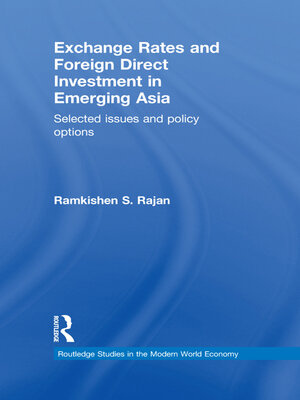Exchange Rates and Foreign Direct Investment in Emerging Asia
ebook ∣ Selected Issues and Policy Options · Routledge Studies in the Modern World Economy
By Ramkishen Rajan

Sign up to save your library
With an OverDrive account, you can save your favorite libraries for at-a-glance information about availability. Find out more about OverDrive accounts.
Find this title in Libby, the library reading app by OverDrive.



Search for a digital library with this title
Title found at these libraries:
| Library Name | Distance |
|---|---|
| Loading... |
With the rapid growth of China and India and the resurgence of Southeast Asia post-1997–8, emerging Asia has once again become one of the most dynamic regions in the world. This dynamism has in turn been fuelled largely by a carefully calibrated embracement of economic openness to international trade, investments and capital flows. While much has been written about international trade, there has been somewhat less work on the issue of capital flows, macroeconomic management and foreign direct investment (FDI) to and from the region, a gap that this book attempts to fill.
The book is divided into two parts. The first part deals with selected issues pertaining to macroeconomic management in small and open economies, with particular focus on exchange rates. The second part of the book deals with the trends and determinants of FDI in emerging Asia, its importance as a source of finance, its impact on growth and development, and the nexus between FDI and foreign portfolio flows (FPI).
Overall, the chapters in this book tackle important policy issues of contemporary relevance, but are informed by analytical frameworks, data and empirics. While each of the topic areas chosen in individual chapters is intentionally narrow, the book as a whole covers a number of areas and countries/regions within Asia (i.e. East, Southeast and South Asia). While the chapters have been written in a manner that can stand up to academic scrutiny, they are also meant to be accessible to policy makers, researchers and others who might be interested in FDI and related issues in Asia.







